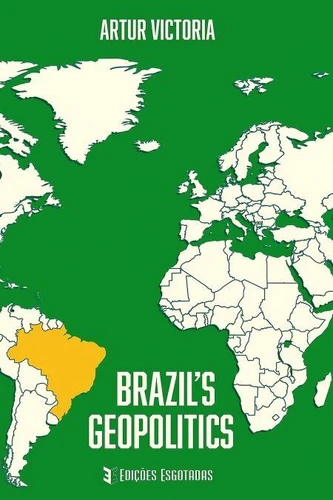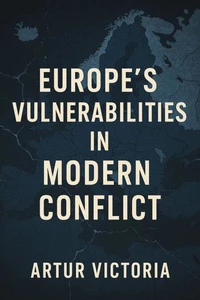Nouveauté
Brazil ´s Geopolitics. Education, #8
Par :Formats :
Disponible dans votre compte client Decitre ou Furet du Nord dès validation de votre commande. Le format ePub protégé est :
- Compatible avec une lecture sur My Vivlio (smartphone, tablette, ordinateur)
- Compatible avec une lecture sur liseuses Vivlio
- Pour les liseuses autres que Vivlio, vous devez utiliser le logiciel Adobe Digital Edition. Non compatible avec la lecture sur les liseuses Kindle, Remarkable et Sony
- Non compatible avec un achat hors France métropolitaine
 , qui est-ce ?
, qui est-ce ?Notre partenaire de plateforme de lecture numérique où vous retrouverez l'ensemble de vos ebooks gratuitement
Pour en savoir plus sur nos ebooks, consultez notre aide en ligne ici
- FormatePub
- ISBN8232905668
- EAN9798232905668
- Date de parution04/11/2025
- Protection num.Adobe DRM
- Infos supplémentairesepub
- ÉditeurHamza elmir
Résumé
Brazil's geopolitics is about a continental nation seeking to define its place in an ever-changing world. Positioned between the vast Atlantic and the intricate dynamics of South America, Brazil has long combined its territorial scale, abundant resources, and diplomatic tradition to pursue influence both regionally and globally. This book explores how geography, history, and strategic thought have shaped Brazil's political trajectory and its aspirations for leadership and autonomy.
Part I examines the historical and strategic foundations of Brazilian geopolitics, tracing the intellectual lineage from the Baron of Rio Branco to key military and civilian thinkers such as Golbery do Couto e Silva, Admiral Mário César Flores, General Carlos de Meira Mattos, and Therezinha de Castro. It analyses Brazil's oscillation between development and non-alignment during the Cold War and the enduring role of soft power in its international identity.
Part II focuses on territory, resources, and internal sovereignty, investigating how geography defines Brazil's strategic posture. From the Amazon Basin and the Andes to the Atlantic coast, and through its great rivers-the Amazon, São Francisco, Paraná and River Plate-the nation's vast natural systems underpin its economic and political integration. Part III explores Brazil as a regional power in South America, assessing its relations with neighbours, the factors shaping its foreign policy, and the opportunities and tensions that accompany regional leadership.
Part IV addresses global geopolitics and strategic partnerships, analysing Brazil's role in the international system, its participation in BRICS, and its complex interactions with the United States, the European Union, and the Portuguese-speaking world (CPLP). Part V turns to Brazil's maritime domain, presenting a geostrategic vision of the South Atlantic, national defence, naval modernisation, and the emerging concept of the "Blue Amazonia, " where maritime security and sustainability converge.
Finally, Part VI introduces the concept of the Atlantic Triangle-a proposal positioning Brazil as a pivotal power linking South America, Africa, and Europe. It argues that this framework represents both a strategic vision and a call to action for Brazil's future role in a multipolar world. Together, these parts offer a comprehensive understanding of Brazil's geopolitical identity-rooted in history, defined by geography, and projected towards a global horizon.
Part I examines the historical and strategic foundations of Brazilian geopolitics, tracing the intellectual lineage from the Baron of Rio Branco to key military and civilian thinkers such as Golbery do Couto e Silva, Admiral Mário César Flores, General Carlos de Meira Mattos, and Therezinha de Castro. It analyses Brazil's oscillation between development and non-alignment during the Cold War and the enduring role of soft power in its international identity.
Part II focuses on territory, resources, and internal sovereignty, investigating how geography defines Brazil's strategic posture. From the Amazon Basin and the Andes to the Atlantic coast, and through its great rivers-the Amazon, São Francisco, Paraná and River Plate-the nation's vast natural systems underpin its economic and political integration. Part III explores Brazil as a regional power in South America, assessing its relations with neighbours, the factors shaping its foreign policy, and the opportunities and tensions that accompany regional leadership.
Part IV addresses global geopolitics and strategic partnerships, analysing Brazil's role in the international system, its participation in BRICS, and its complex interactions with the United States, the European Union, and the Portuguese-speaking world (CPLP). Part V turns to Brazil's maritime domain, presenting a geostrategic vision of the South Atlantic, national defence, naval modernisation, and the emerging concept of the "Blue Amazonia, " where maritime security and sustainability converge.
Finally, Part VI introduces the concept of the Atlantic Triangle-a proposal positioning Brazil as a pivotal power linking South America, Africa, and Europe. It argues that this framework represents both a strategic vision and a call to action for Brazil's future role in a multipolar world. Together, these parts offer a comprehensive understanding of Brazil's geopolitical identity-rooted in history, defined by geography, and projected towards a global horizon.
Brazil's geopolitics is about a continental nation seeking to define its place in an ever-changing world. Positioned between the vast Atlantic and the intricate dynamics of South America, Brazil has long combined its territorial scale, abundant resources, and diplomatic tradition to pursue influence both regionally and globally. This book explores how geography, history, and strategic thought have shaped Brazil's political trajectory and its aspirations for leadership and autonomy.
Part I examines the historical and strategic foundations of Brazilian geopolitics, tracing the intellectual lineage from the Baron of Rio Branco to key military and civilian thinkers such as Golbery do Couto e Silva, Admiral Mário César Flores, General Carlos de Meira Mattos, and Therezinha de Castro. It analyses Brazil's oscillation between development and non-alignment during the Cold War and the enduring role of soft power in its international identity.
Part II focuses on territory, resources, and internal sovereignty, investigating how geography defines Brazil's strategic posture. From the Amazon Basin and the Andes to the Atlantic coast, and through its great rivers-the Amazon, São Francisco, Paraná and River Plate-the nation's vast natural systems underpin its economic and political integration. Part III explores Brazil as a regional power in South America, assessing its relations with neighbours, the factors shaping its foreign policy, and the opportunities and tensions that accompany regional leadership.
Part IV addresses global geopolitics and strategic partnerships, analysing Brazil's role in the international system, its participation in BRICS, and its complex interactions with the United States, the European Union, and the Portuguese-speaking world (CPLP). Part V turns to Brazil's maritime domain, presenting a geostrategic vision of the South Atlantic, national defence, naval modernisation, and the emerging concept of the "Blue Amazonia, " where maritime security and sustainability converge.
Finally, Part VI introduces the concept of the Atlantic Triangle-a proposal positioning Brazil as a pivotal power linking South America, Africa, and Europe. It argues that this framework represents both a strategic vision and a call to action for Brazil's future role in a multipolar world. Together, these parts offer a comprehensive understanding of Brazil's geopolitical identity-rooted in history, defined by geography, and projected towards a global horizon.
Part I examines the historical and strategic foundations of Brazilian geopolitics, tracing the intellectual lineage from the Baron of Rio Branco to key military and civilian thinkers such as Golbery do Couto e Silva, Admiral Mário César Flores, General Carlos de Meira Mattos, and Therezinha de Castro. It analyses Brazil's oscillation between development and non-alignment during the Cold War and the enduring role of soft power in its international identity.
Part II focuses on territory, resources, and internal sovereignty, investigating how geography defines Brazil's strategic posture. From the Amazon Basin and the Andes to the Atlantic coast, and through its great rivers-the Amazon, São Francisco, Paraná and River Plate-the nation's vast natural systems underpin its economic and political integration. Part III explores Brazil as a regional power in South America, assessing its relations with neighbours, the factors shaping its foreign policy, and the opportunities and tensions that accompany regional leadership.
Part IV addresses global geopolitics and strategic partnerships, analysing Brazil's role in the international system, its participation in BRICS, and its complex interactions with the United States, the European Union, and the Portuguese-speaking world (CPLP). Part V turns to Brazil's maritime domain, presenting a geostrategic vision of the South Atlantic, national defence, naval modernisation, and the emerging concept of the "Blue Amazonia, " where maritime security and sustainability converge.
Finally, Part VI introduces the concept of the Atlantic Triangle-a proposal positioning Brazil as a pivotal power linking South America, Africa, and Europe. It argues that this framework represents both a strategic vision and a call to action for Brazil's future role in a multipolar world. Together, these parts offer a comprehensive understanding of Brazil's geopolitical identity-rooted in history, defined by geography, and projected towards a global horizon.






















